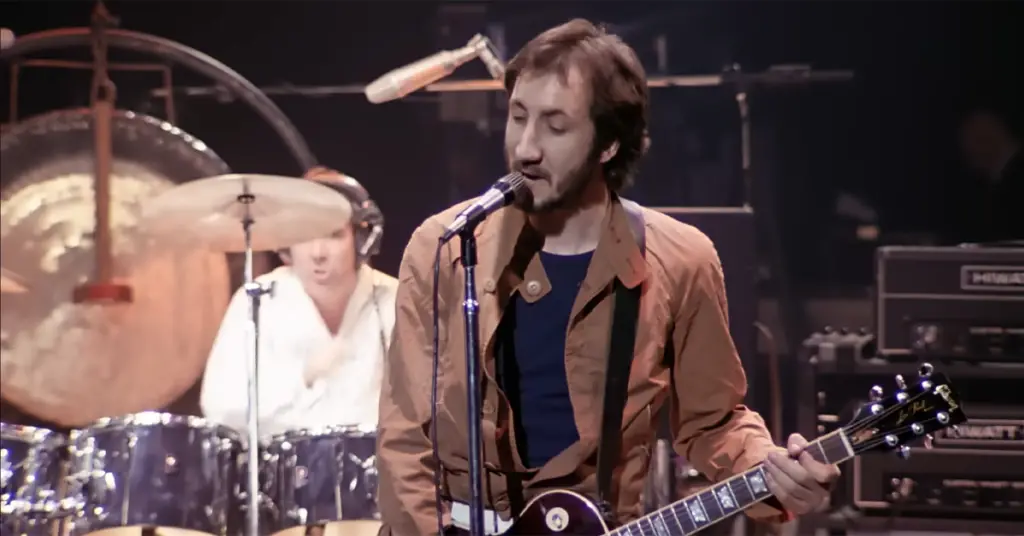The Who – “Won’t Get Fooled Again”: Revolution, Rock, and Reluctance
There are protest songs that light a spark, and then there’s “Won’t Get Fooled Again”—a thunderous warning that revolution doesn’t always mean redemption. Released by The Who in 1971, this track didn’t beg for change. It roared in distrust of it, with a sound as massive and ferocious as its message.
Built on Pete Townshend’s mix of cynicism, spirituality, and synthesizers, “Won’t Get Fooled Again” is the band’s ultimate epic—a song that fuses blistering rock with philosophical grit. It’s not just about rebelling—it’s about waking up afterwards and realizing you’re back where you started.
The Sound: Synths, Power Chords, and Pure Fury
Musically, the song is a masterpiece of dynamics and tension. It opens with one of the earliest—and most iconic—uses of a synthesizer in rock. Townshend’s ARP synthesizer loop pulses like a futuristic heartbeat, setting a tone that’s both hypnotic and urgent.
Then the band crashes in. Keith Moon’s drums explode like controlled chaos, John Entwistle’s bass rumbles like thunder, and Roger Daltrey’s vocals arrive like a preacher in a riot. And when Townshend slashes through with his signature windmill guitar, the energy becomes unstoppable.
Clocking in at over eight minutes, the track isn’t bloated—it’s majestic. Each build and break intensifies the drama until it all erupts into that final, primal scream:
“YEEEEAAAHHHH!”
That scream—raw, unfiltered, legendary—is Daltrey channeling generations of disillusionment into a single, electrifying moment.
The Lyrics: Meet the New Boss…
“We’ll be fighting in the streets / With our children at our feet…”
Right from the first line, “Won’t Get Fooled Again” drops us into revolution. But this isn’t a celebration. It’s a cautionary tale. Townshend isn’t condemning the spirit of rebellion—he’s questioning its results.
The chorus drives it home:
“I’ll tip my hat to the new constitution / Take a bow for the new revolution…”
“Then I’ll get on my knees and pray / We don’t get fooled again.”
It’s not nihilism. It’s realism. The song understands how systems of power cycle and repeat, how movements can be co-opted, and how the people in charge often stay in charge—no matter the slogans.
And then, that final dagger:
“Meet the new boss / Same as the old boss.”
It’s eight words that puncture political illusion better than any speech ever could.
Creation and Context: From Rock Opera to Rock Manifesto
“Won’t Get Fooled Again” was originally written for Lifehouse, a complex science-fiction project Townshend envisioned as a follow-up to Tommy. The project was ultimately abandoned, but this song—one of its central pieces—survived and found a home as the climactic closer on Who’s Next (1971).
The timing was perfect. The early ‘70s were steeped in political unrest—Vietnam, Watergate, generational disillusionment. “Won’t Get Fooled Again” gave voice to those who had marched, hoped, and then watched it all fall apart.
Legacy: Rock’s Loudest Eye-Opener
Over time, “Won’t Get Fooled Again” became a stadium anthem, a political lightning rod, and one of The Who’s most enduring legacies. It’s been used in films, rallies, and TV shows (notably CSI: Miami), where its massive intro and that scream became instantly recognizable.
But its real power lies in its message. It challenges listeners not just to rage, but to think. It’s not about giving up. It’s about being wiser the next time around.
Live, the song remains a behemoth—often closing The Who’s shows with lights blazing, amps roaring, and Roger Daltrey still screaming like the world depends on it.

Final Thoughts
“Won’t Get Fooled Again” isn’t just one of the greatest rock songs ever recorded.
It’s a philosophical wall of sound, warning us that change without awareness is just a new costume on the same puppet show.
It’s loud.
It’s defiant.
And it still asks a hard, essential question:
Will we get fooled again?
Want to follow up with deep dives into Who’s Next classics like “Baba O’Riley” or “Behind Blue Eyes”? Or go back to the revolutionary vibes of Tommy and Quadrophenia? Let me know—there’s a lot of Who history worth exploring!


Facebook Comments